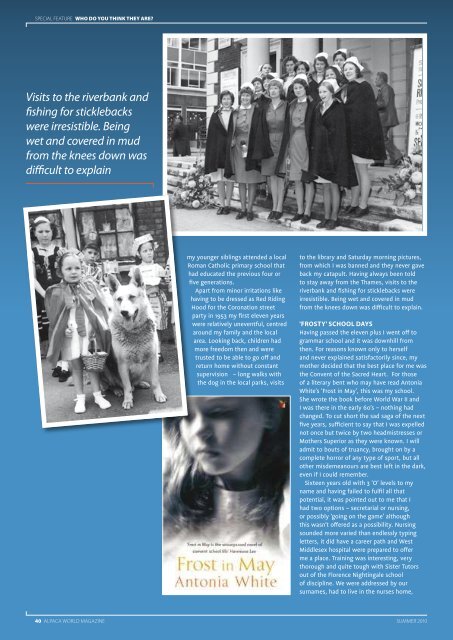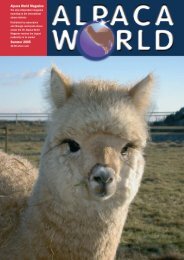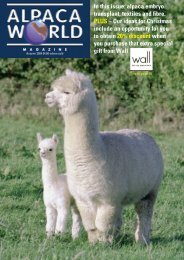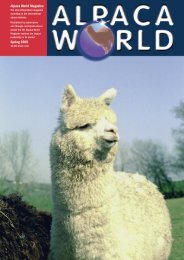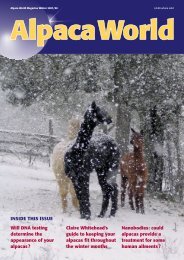Create successful ePaper yourself
Turn your PDF publications into a flip-book with our unique Google optimized e-Paper software.
special feature who do you think they are<br />
Article Category Main Heading<br />
Visits to the riverbank and<br />
fishing for sticklebacks<br />
were irresistible. Being<br />
wet and covered in mud<br />
from the knees down was<br />
difficult to explain<br />
Although extremely<br />
demanding it was<br />
a wonderful way to spend<br />
three years, not least because the job<br />
description required me to live in the Abbey<br />
my younger siblings attended a local<br />
Roman Catholic primary school that<br />
had educated the previous four or<br />
five generations.<br />
Apart from minor irritations like<br />
having to be dressed as Red Riding<br />
Hood for the Coronation street<br />
party in 1953 my first eleven years<br />
were relatively uneventful, centred<br />
around my family and the local<br />
area. Looking back, children had<br />
more freedom then and were<br />
trusted to be able to go off and<br />
return home without constant<br />
supervision – long walks with<br />
the dog in the local parks, visits<br />
to the library and Saturday morning pictures,<br />
from which I was banned and they never gave<br />
back my catapult. Having always been told<br />
to stay away from the Thames, visits to the<br />
riverbank and fishing for sticklebacks were<br />
irresistible. Being wet and covered in mud<br />
from the knees down was difficult to explain.<br />
'Frosty' school days<br />
Having passed the eleven plus I went off to<br />
grammar school and it was downhill from<br />
then. For reasons known only to herself<br />
and never explained satisfactorily since, my<br />
mother decided that the best place for me was<br />
the Convent of the Sacred Heart. For those<br />
of a literary bent who may have read Antonia<br />
White’s ‘Frost in May’, this was my school.<br />
She wrote the book before World War II and<br />
I was there in the early 60’s – nothing had<br />
changed. To cut short the sad saga of the next<br />
five years, sufficient to say that I was expelled<br />
not once but twice by two headmistresses or<br />
Mothers Superior as they were known. I will<br />
admit to bouts of truancy, brought on by a<br />
complete horror of any type of sport, but all<br />
other misdemeanours are best left in the dark,<br />
even if I could remember.<br />
Sixteen years old with 3 ‘O’ levels to my<br />
name and having failed to fulfil all that<br />
potential, it was pointed out to me that I<br />
had two options – secretarial or nursing,<br />
or possibly ‘going on the game’ although<br />
this wasn’t offered as a possibility. Nursing<br />
sounded more varied than endlessly typing<br />
letters, it did have a career path and West<br />
Middlesex hospital were prepared to offer<br />
me a place. Training was interesting, very<br />
thorough and quite tough with Sister Tutors<br />
out of the Florence Nightingale school<br />
of discipline. We were addressed by our<br />
surnames, had to live in the nurses home,<br />
a former workhouse building, and appear<br />
every morning in aprons so starched it was<br />
like wearing a bright white corset. One of<br />
the biggest stumbling blocks for me was the<br />
requirement to be in before midnight when<br />
the doors would be locked and the only way<br />
to gain access was find Night Sister, sign the<br />
book and have the door unlocked. The only<br />
solution to this restriction was the acquisition<br />
of one’s own key.<br />
Some of the skills I learnt whilst training as<br />
an SRN have stayed with me and proved very<br />
useful; injecting alpacas was never going to be<br />
a problem and I’m a dab hand at enemas.<br />
checking in<br />
Like many other refugees from nursing I<br />
left the caring profession and joined British<br />
Airways or BEA as it still was. If you can<br />
imagine Terminal 1, empty of shops, with very<br />
few passengers,<br />
no charter flights and check-in desks with<br />
no queues, that is what it was like when it<br />
opened in March 1969. Staff had bicycles that<br />
were used to get from one end of the building<br />
to the other – forty years ago it was the<br />
largest building for passengers at Heathrow.<br />
Life with BA was interesting, well paid with<br />
a great social life and travel concessions that<br />
enabled staff to travel anywhere in the world<br />
for 10% of the full fare. For five years this was<br />
all I wanted until the day I realised that I had<br />
once had a brain and if my future was going<br />
to consist of anything more challenging than<br />
writing out airline tickets, before the days of<br />
computers, I needed qualifications.<br />
Accordingly, I left the world of airlines and,<br />
after a couple of false starts, was offered a<br />
place at Oxford Poly, now Oxford Brookes<br />
University, to read Environmental Biology. The<br />
false starts included quite a lot of time when<br />
I did a series of jobs including car auctions,<br />
assistant tote manager at White City dog<br />
track, croupier and others best left in the<br />
mists of time.<br />
1980 was the year of change; I graduated,<br />
bought my first house and joined IBM, all very<br />
respectable and a bit of a shock to the system.<br />
All of a sudden, at the age of thirty, I’d joined<br />
the ranks of the professional middle classes,<br />
paid my mortgage, wore a suit to work, had<br />
a company car and carried a briefcase. As a<br />
trainee Systems Engineer I learnt to manage<br />
the installation of mainframe computers<br />
that required a large room, their own air<br />
conditioning and still didn’t have the capacity<br />
of an iPhone.<br />
In those days IBM had a career development<br />
programme and offered to fund a three year,<br />
part-time MBA at the London Business School.<br />
My life was becoming ever more respectable<br />
by the minute! I learnt a lot at LBS, partly what<br />
I was meant to learn but also where I parted<br />
from the conventional MBA student aspiration.<br />
Accountancy bored me, project management<br />
was what I did everyday at work and I had no<br />
desire to become a brand manager for Kraft<br />
or Shell. My idea of business had been shaped<br />
in my very early years when accompanying<br />
my grandfather; he would pull out a large roll<br />
from his back pocket and make the owner<br />
an offer for a houseful of furniture or a<br />
particularly desirable antique.<br />
Probably the most significant outcome<br />
of LBS was meeting my partner – Miranda.<br />
In 1984 she was on a mission to escape<br />
the BBC and, as those of you who know<br />
her will realise, she has managed this most<br />
successfully and in the process contributed<br />
greatly to the survival of BA with her frequent<br />
flying.<br />
things that go bump in the night<br />
High flying, no pun intended, executive was<br />
not to be my future and leaving IBM and the<br />
LBS behind me I started work for the National<br />
Trust in Devon. Buckland Abbey lies just north<br />
of Plymouth, had been a monastery and<br />
subsequently the home of Sir Francis Drake.<br />
As project manager I was responsible, over a<br />
period of three years, for the restoration of<br />
the building and grounds to National Trust<br />
standards and then to open the property to<br />
the public. Although extremely demanding it<br />
was a wonderful way to spend three years,<br />
not least because the job description required<br />
me to live in the Abbey and, yes, it is haunted.<br />
Once the property was open to the public<br />
it was time for me to move on. Becoming<br />
the first Director of the Marine Conservation<br />
Society enabled me to make use of my<br />
management experience, biology degree<br />
and love of scuba diving. Managing a group<br />
40 Alpaca World Magazine<br />
summer 2010 summer 2010<br />
Alpaca World Magazine 41


